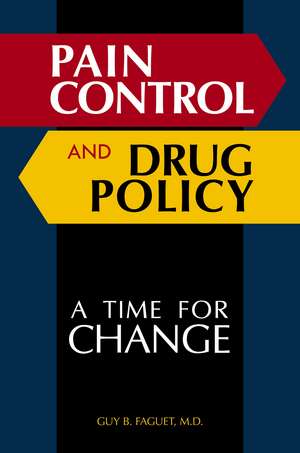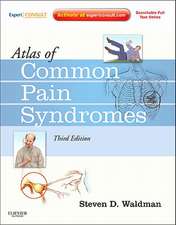Pain Control and Drug Policy: A Time for Change
Autor Guy B. Faguet M.D.en Limba Engleză Paperback – 14 apr 2010 – vârsta până la 17 ani
| Toate formatele și edițiile | Preț | Express |
|---|---|---|
| Paperback (1) | 231.16 lei 6-8 săpt. | |
| Bloomsbury Publishing – 14 apr 2010 | 231.16 lei 6-8 săpt. | |
| Hardback (1) | 462.03 lei 6-8 săpt. | |
| Bloomsbury Publishing – 14 apr 2010 | 462.03 lei 6-8 săpt. |
Preț: 231.16 lei
Preț vechi: 338.76 lei
-32% Nou
Puncte Express: 347
Preț estimativ în valută:
44.25€ • 46.17$ • 37.10£
44.25€ • 46.17$ • 37.10£
Carte tipărită la comandă
Livrare economică 12-26 martie
Preluare comenzi: 021 569.72.76
Specificații
ISBN-13: 9781440835841
ISBN-10: 1440835845
Pagini: 256
Dimensiuni: 156 x 235 x 14 mm
Greutate: 0.36 kg
Editura: Bloomsbury Publishing
Colecția Praeger
Locul publicării:New York, United States
ISBN-10: 1440835845
Pagini: 256
Dimensiuni: 156 x 235 x 14 mm
Greutate: 0.36 kg
Editura: Bloomsbury Publishing
Colecția Praeger
Locul publicării:New York, United States
Caracteristici
Chronologies showing the events that led to Prohibition and its repeal, of drug use through the ages, and of the political history of drug policy in the United States and worldwide
Notă biografică
Guy B. Faguet is retired professor of medicine in hematology/oncology at the Medical College of Georgia in Augusta, GA, where he practiced, taught, and conducted research for 30 years.
Cuprins
PrefaceI. History and Politics of Mind-Altering Drugs1 Prohibition: An Historical Precedent
Alcohol Manufacture and Consumption
Health Effects
Crime and Corruption
2 The Lure of Mind-Altering Substances
Poppy and Opium through the AgesAntiquityThe Ancient GreeksThe MuslimsIndia and ChinaDrugs in the 21st CenturyWorldwide Drug ConsumptionTrends in Global Drug ConsumptionTrends in U.S. Drug Consumption3 The Politics of Drug Legislation
A Convoluted American Political Saga
Global Drug Control: International ConventionsII. Medical Aspects of Mind-Altering Drugs4 Current Theories of Addiction
The Disease (Victim) Model
The Behavioral (Choice) Model
5 Pain Control: Narcotics and the DEA
The Specter of the DEA
DEA's Infringement on Standard of Care
6 Painkillers
Narcotics (Opioids)Mechanisms of ActionEfficacyGeneral Principals of AdministrationSide EffectsNonopioidsMechanisms of ActionEfficacyGeneral Principals of AdministrationSide EffectsIII. Geopolitics: Casualties of the Drug War7 Colombia
From "La Violencia" to Self-Defense Armies
Guerrilla and Counter-Guerrilla Armies: Origins and EvolutionFuerzas Armadas Revolucionarias de Colombia (FARC)Ejército de Liberación Nacional (ELN)Autodefensas Unidas de Colombia (AUC) or Paramilitares8 Afghanistan
The Early Days: Prying by the British Empire
Events Leading to the Soviet Invasion
The Soviet-Afghan War (1979-1989)
The Aftermath of the Soviet-Afghan War
The Rise and Fall of the TalibanNational and International ImplicationsOpium Production and the TalibanIV. Reforming Drug Policy9 Reform Proposals
Framing the Discussion
Illustrative Reform Proposals and PositionsThe RAND Corporation ProposalThe Senlis Council ProposalThe Cato Institute's Stance10 A Rational, Evidence-Driven Drug PolicyConclusionsReferencesIndex









